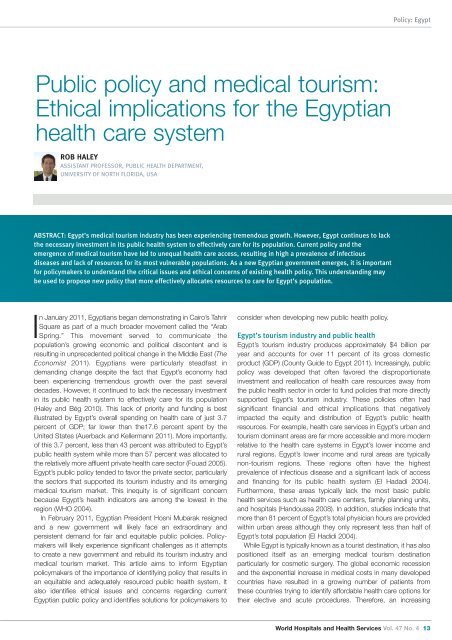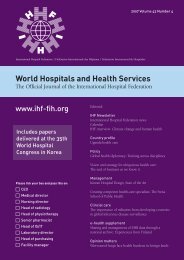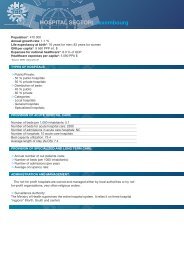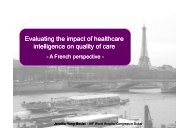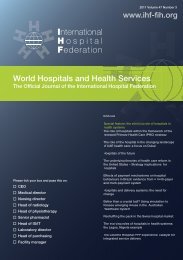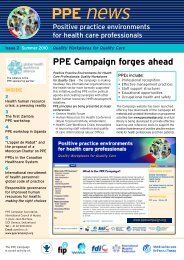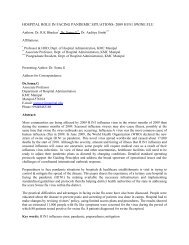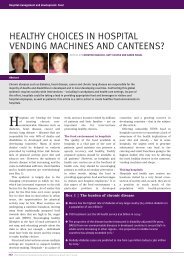web_vol47 4.pdf - International Hospital Federation
web_vol47 4.pdf - International Hospital Federation
web_vol47 4.pdf - International Hospital Federation
Create successful ePaper yourself
Turn your PDF publications into a flip-book with our unique Google optimized e-Paper software.
Policy: Egypt<br />
Public policy and medical tourism:<br />
Ethical implications for the Egyptian<br />
health care system<br />
ROB HALEY<br />
ASSISTANT PROFESSOR, PUBLIC HEALTH DEPARTMENT,<br />
UNIVERSITY OF NORTH FLORIDA, USA<br />
ABSTRACT: Egypt’s medical tourism industry has been experiencing tremendous growth. However, Egypt continues to lack<br />
the necessary investment in its public health system to effectively care for its population. Current policy and the<br />
emergence of medical tourism have led to unequal health care access, resulting in high a prevalence of infectious<br />
diseases and lack of resources for its most vulnerable populations. As a new Egyptian government emerges, it is important<br />
for policymakers to understand the critical issues and ethical concerns of existing health policy. This understanding may<br />
be used to propose new policy that more effectively allocates resources to care for Egypt’s population.<br />
In January 2011, Egyptians began demonstrating in Cairo’s Tahrir<br />
Square as part of a much broader movement called the “Arab<br />
Spring.” This movement served to communicate the<br />
population’s growing economic and political discontent and is<br />
resulting in unprecedented political change in the Middle East (The<br />
Economist 2011). Egyptians were particularly steadfast in<br />
demanding change despite the fact that Egypt’s economy had<br />
been experiencing tremendous growth over the past several<br />
decades. However, it continued to lack the necessary investment<br />
in its public health system to effectively care for its population<br />
(Haley and Bég 2010). This lack of priority and funding is best<br />
illustrated by Egypt’s overall spending on health care of just 3.7<br />
percent of GDP; far lower than the17.6 percent spent by the<br />
United States (Auerback and Kellermann 2011). More importantly,<br />
of this 3.7 percent, less than 43 percent was attributed to Egypt’s<br />
public health system while more than 57 percent was allocated to<br />
the relatively more affluent private health care sector (Fouad 2005).<br />
Egypt’s public policy tended to favor the private sector, particularly<br />
the sectors that supported its tourism industry and its emerging<br />
medical tourism market. This inequity is of significant concern<br />
because Egypt’s health indicators are among the lowest in the<br />
region (WHO 2004).<br />
In February 2011, Egyptian President Hosni Mubarak resigned<br />
and a new government will likely face an extraordinary and<br />
persistent demand for fair and equitable public policies. Policymakers<br />
will likely experience significant challenges as it attempts<br />
to create a new government and rebuild its tourism industry and<br />
medical tourism market. This article aims to inform Egyptian<br />
policymakers of the importance of identifying policy that results in<br />
an equitable and adequately resourced public health system. It<br />
also identifies ethical issues and concerns regarding current<br />
Egyptian public policy and identifies solutions for policymakers to<br />
consider when developing new public health policy.<br />
Egypt’s tourism industry and public health<br />
Egypt’s tourism industry produces approximately $4 billion per<br />
year and accounts for over 11 percent of its gross domestic<br />
product (GDP) (County Guide to Egypt 2011). Increasingly, public<br />
policy was developed that often favored the disproportionate<br />
investment and reallocation of health care resources away from<br />
the public health sector in order to fund policies that more directly<br />
supported Egypt’s tourism industry. These policies often had<br />
significant financial and ethical implications that negatively<br />
impacted the equity and distribution of Egypt’s public health<br />
resources. For example, health care services in Egypt’s urban and<br />
tourism dominant areas are far more accessible and more modern<br />
relative to the health care systems in Egypt’s lower income and<br />
rural regions. Egypt’s lower income and rural areas are typically<br />
non-tourism regions. These regions often have the highest<br />
prevalence of infectious disease and a significant lack of access<br />
and financing for its public health system (El Hadadi 2004).<br />
Furthermore, these areas typically lack the most basic public<br />
health services such as health care centers, family planning units,<br />
and hospitals (Handoussa 2008). In addition, studies indicate that<br />
more than 81 percent of Egypt’s total physician hours are provided<br />
within urban areas although they only represent less than half of<br />
Egypt’s total population (El Hadidi 2004).<br />
While Egypt is typically known as a tourist destination, it has also<br />
positioned itself as an emerging medical tourism destination<br />
particularly for cosmetic surgery. The global economic recession<br />
and the exponential increase in medical costs in many developed<br />
countries have resulted in a growing number of patients from<br />
these countries trying to identify affordable health care options for<br />
their elective and acute procedures. Therefore, an increasing<br />
World <strong>Hospital</strong>s and Health Services Vol. 47 No. 4 13


